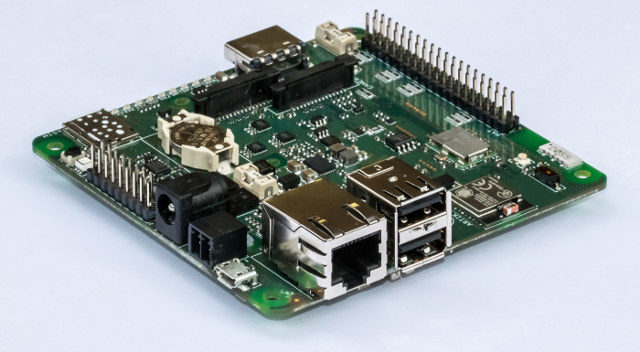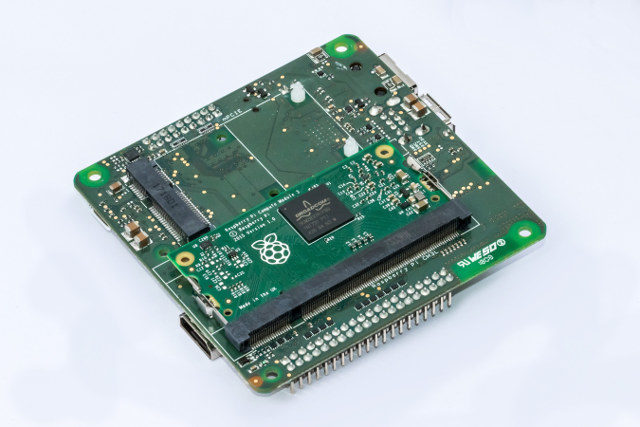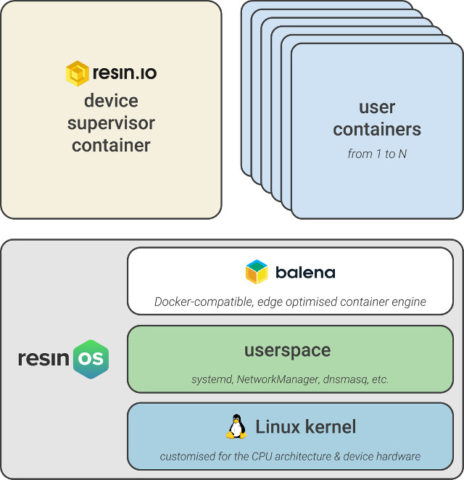[Update January 2019: Resin.io Project Fin has been renamed to BalenaFin, I have not changed the rest of the article]
Resin.io is a both a company and a software platform that includes device, server, and client software to get code securely deployed to a fleet of devices. Devices are setup to run ResinOS, and to deploy you app, you just need to push the code to resin.io build servers, where it will be packaged into containers and delivered to your fleet of boards.
So far, resin.io relied on existing hardware platforms like Raspberry Pi 3, BeagleBone Black, or Intel NUCs, but they’ve now decided to launch their first hardware with Project Fin that takes a Raspberry Pi Compute Module 3 Lite, is hardened for field deployment use cases, and adds some of most commonly requested hardware features such as variable supply voltage support, RTC, and cellular connectivity (via mPCIe card).

Project Fin board specifications:
- Main Processor
- SoM – Raspberry Pi Compute Module 3 Lite with Broadcom BCM2837 quad-core ARM Cortex A53 processor at 1.2GHz, 1GB RAM
- Storage – 8, 16, 32, or 64 GB eMMC 5.1 flash
- Connectivity – Fast Ethernet, Dual-band 802.11ac/a/b/g/n 2.4 & 5GHz WiFi + Bluetooth 4.2
- Expansion
- Raspberry Pi 40-pin HAT
- 1x Mini PCI Express subset socket (USB, UART and I2C with nano-SIM card reader)
- Video Output / Display – HDMI output, RPi display connector
- Camera – RPi camera connector
- USB – 2x USB 2.0 Type-A ports
- Co-processor
- IoT Module – Samsung Artik 020 IoT module with Arm Cortex M4 MCU @ 40 MHz, 32kB RAM, 256 kB flash, Bluetooth 4.2 Smart connectivity
- I/O – I2C, SPI, UART, GPIO, ADC
- Misc – RTC Via I2C chip with coin-cell battery, 1x RGB LED, 9 x Status LEDs
- Power Supply – 6 to 30V (5V @ 2.5A via HAT)
- Temperature Range – -25 to 70°C

They’ve added the Artik module for real-time tasks, and low-power scenarios, when the Compute Module can be turned off. The MCU can also access the RTC and communicate over Bluetooth in this case.
The mini PCIe slot is specifically designed for cellular modem, which explains why they’ve also added a SIM card slot.

Some typical use cases for Resin.io and Project Fin include Connected Home applications, manufacturing & logistics, marketing & retail, and any fleet of connected (Linux) devices that needs to be easily updated.
The carrier baord is not available yet, but the company aims to sell the 8GB flash version for $129 to which you’ll also need to add $25 to $30 for Raspberry Pi CM3L. The first production batch is expected for later in Q2 2018.

Jean-Luc started CNX Software in 2010 as a part-time endeavor, before quitting his job as a software engineering manager, and starting to write daily news, and reviews full time later in 2011.
Support CNX Software! Donate via cryptocurrencies, become a Patron on Patreon, or purchase goods on Amazon or Aliexpress. We also use affiliate links in articles to earn commissions if you make a purchase after clicking on those links.




